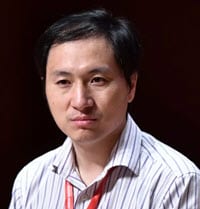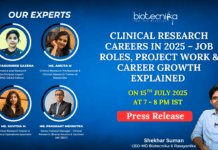CRISPR Baby Scandal – All You Need To Know
Voice of Biotecnika – Episode No: 38
Hello everyone and welcome once again to our weekly podcast channel – Voice of Biotecnika. Today we will talk about the controversial – CRISPR baby scandal.
It all started when a Chinese researcher claimed that he had used the gene-editing technique CRISPR–Cas9 to modify human embryos in order to make them HIV resistant and after implanting them into a woman, have made the first CRISPR-edited babies, twin girls named Lulu and Nana. Those two became the first human beings born with genetic modifications that were directed by human beings. It provoked an international outcry; it is like a bombshell revelation.
And it just gets worse by the day. It seems that there were a lot of technical errors and ethical blunders in this alleged creation of the world’s first gene-edited infants.
Listen to the above podcast on SoundCloud
You may have heard about him in my other podcast on CRISPR’s potential uses, where I had mentioned him to be using the CRISPR/Cas9 system to modify the genes of twin girls so that they are born with a deletion in the CCR5 gene, thus
conferring resistance to HIV infection.Yes, We are talking about He Jiankui. He became the center of a global firestorm on November 25th, 2018, when he made this fact known to the world.
Although he has been sharply criticized for flouting international recommendations and going against ethics rules, it is notable that he did not keep his gene-editing ambitions entirely secret. In fact, the young researcher had widely telegraphed his plans and shared aspects of his plans among senior American scientists and ethicists, hoping to win their endorsement, and seeking advice, and help with publications. Dr. He had explained the experiment behind it at an international gene-editing summit in Hong Kong. In fact, he also revealed that yet another early pregnancy is also underway.
Although it is still unclear, if his claims are correct, as there is no definitive evidence, if he was actually successful in modifying the girl’s genes, yet he was flooded with a swift series of strong reactions and negative comments.
CRISPR pioneer Jennifer Doudna was actually “horrified” on hearing this, and according to NIH Director Francis Collins, this experiment was “profoundly disturbing”. Even Julian Savulescu, an ethicist, who feels that gene-editing research is a “moral responsibility”, has described Dr, He’s work to be “monstrous”.
Dr. Kiran Musunuru from the University of Pennsylvania, an expert who has no role in the experiment considers it unethical. He feels that we still have a lot of work to do to prove and establish that the procedure is actually safe. He said that no babies should be born at this point of time following the use of this technology and that this is too early and too immature. He and many mainstream scientists say that this type of gene editing should not be attempted yet because it could make permanent damages to DNA that could affect future generations or be harmful if other genes are affected.
It is extremely important to balance the potential benefits with the potential risks for the people involved. In cases where the potential risks are substantially higher than the benefits, which are in the case of Dr. He’s incident, is not ethical at all.
He’s choice to alter the particular CCR5 gene has also been criticized by many scientists,

partly because of the other ways available to stop people from contracting HIV, like using cesarean sections to deliver the babies of mothers with the virus. Critics feel that other diseases, like Huntington’s disease of Tay-Sachs disease, would be more obvious targets for elimination through editing embryonic genomes.
Dr. He was aiming at mimicking a mutation existing in about 10% of Europeans, which helps to protect them from HIV infection. But it may be possible that He might have caused mutations in other parts of the genome, which could lead to unpredictable health consequences. Also, CCR5 is believed to be helping people fight off the effects of various other infections, such as West Nile virus. So, if the gene is disabled, the twins could actually become vulnerable, although it may years to identify those health effects. But if they do suffer, and a link is found with He’s experiment, then He could be sentenced to imprisonment on charges of practicing medicine illegally, says Zhang Peng, a criminal-law scholar at Beijing Wuzi University.
Gene editing has been attempted to treat serious diseases in people, but those changes are only in that person. It is not allowed in the US and many other countries on embryos intended for pregnancy.
Shoukhrat Mitalipov, a reproductive biologist at the Oregon Health & Science University in Portland, fears that this controversy may affect factors such as funding and regulatory approvals. Mitalipov works on repairing mutated genes in human embryos and hopes to edit out heritable diseases once a day with this approach. The US government prohibits federal funding for such experiments, still, Mitalipov and a few other US researchers have somehow managed to get other grant money for their work. This incident makes Mitalipov cautious, like whether this will cause them to face a backlash.
He’s experiment leaves an array of other unanswered questions, like whether the prospective parents were properly informed of the risks; why He chose CCR5 modification when clearly there were other, proven methods for HIV prevention; why he chose to do the experiment with couples in which the men have HIV, as it’s a known fact that women with HIV have a higher chance of passing the virus on to their children; and what were the risks of knocking out CCR5, a gene which is normally present in people, and which could have some necessary but still unknown functions. All these points actually outweighed the benefits in this case.
Chinese authorities’ investigation found that He Jiankui had broken national regulations in his controversial work on gene-edited babies. He was even fired by his university. The decision was announced by the Southern University of Science and Technology in Shenzhen, in China’s Guandong province on 21st January 2019. This was followed by an investigation by the provincial health authorities, the Guagdong health ministry, which were tasked by the national health ministry to examine the He affair. They had found that He broke the national regulations against usage of gene-editing for reproductive purposes. They even found that He’s experiment went against them. During the recruitment of participants, Dr. He had used forged ethics-review documents and had swapped blood samples to skirt laws and national regulations which forbids people with HIV from using assisted reproductive technologies. This allegation was reported for the first time in the Xinhua article. He is fully blamed for this and is criticized for doing all these in pursuit of “fame and fortune”, deliberately evading oversight.
The Xinhua article states that He’s gene-editing activities were “clearly prohibited by the state”, although it doesn’t mention any punishable crimes and exactly which specific laws or regulations have been broken. The article also reports that He and others implicated in the case are going to be dealt with seriously and that the police might now get involved.
The article even confirms many details of the case for the first time, like starting from June 2016. According to it, Dr. He had put together a team that, from March 2017, recruited eight couples, which consisted of an HIV-positive father and an HIV-negative mother. After which He’s team had edited the genes of embryos from at least two couples. In also reported that one other woman involved in the experiment is currently pregnant with a gene-edited embryo.
Keeping in mind the conclusions by Guangdong team, China’s education ministry has announced that they are going to collaborate with other ministries and departments in building a better regulatory system for overseeing science that will help in improving the ethical review of scientific projects. Stricter laws could be around the corner.
Officials at Stanford University are also enquiring some of the several high-profile scientists whom He had consulted, they want to understand what liabilities or risks Stanford may have in connection with the controversial medical experiment.
Few scientists, including the CRISPR pioneer Feng Zhang and stem-cell biologist Paul Knoepfler, have also called for a temporary moratorium on such embryonic gene editing experiments, in the wake of He’s bombshell.
What Dr. He is actually criticized for, is not for his attempt of germ-line editing, but because he had neglected adequate safety testing and did not follow standard procedures in procuring participants. He hadn’t even responded to Nature’s multiple attempts to contact him.
So what’s next for Human Gene-Editing? Dr. He has taken a giant leap into an era in which science could rewrite the gene pool of future generations, by engineering mutations into human embryos and by altering the human germline. He has also flouted established norms for safety and human protections along the way. The experiments have attracted so much attention, that it could easily alter research in the coming years. He’s actions could practically stall the responsible development of gene editing babies.
There is also a concern about how the future of this field can be affected by public scrutiny, i.e whether or not researchers will look at altering the germ-line anymore. Negative focus is of course not good. Yet some predict that this incident may, in fact, propel human gene-editing forwards. According to Jonathan Kimmelman, who specializes in human trials of gene therapies at McGill University in Montreal, the definitive actions of this scandal can expedite global cooperation on the science and its oversight, which would definitely stimulate meaningful advances in this area.
On the other hand, if you see, there is actually nothing wrong in helping human beings! This is evolution happening right before our eyes! The Future of the human race is here! Scientists are the celebrities of the future! To be clear, no researcher or scientist ever say that CRISPR is bad for baby for sure. It is more of a question of whether there’s unknown side effect. But someone has to get this started, the sooner the better, so may be He’s attempt should be appreciate that he took the risk and got it done.
Many brand new technologies come with small unknown risk, but we still have to look at the overall pro and cons. Even now there are people who still argue that electromagnetic wave is very bad for health. Imagine if those people had the upper hand back then, and banned the release of radio technology. There would be no radio, GPS, wifi, cellular communications, etc.
But in the end, it’s the society who will decide how to move forward. The more people can afford to have their genes changed; more funds can go to the project. The more acceptive society is towards the programme, the more flexible it is for the rich to alter their genes. It’s a win win scenario for both rich and poor, There should also be a government subsidy helping the poor family to have their babies’ gene changed!
So what do you feel about this – CRISPR Baby Scandal? Is it even justified to be called as a scandal after all? Or you completely support the negative reviews raised on Dr. He’s work. We would love to know your opinions. Do let us know in the comments section. Ladies and Gentlemen, Boys and Girls, this was Biotecnika for you. Thank you.









































Don’t even try to touch or play with nature.. otherwise, no one can imagine the results.., Humans already have done so much worse with nature.. I beg plz stop all this shit!!!!!!!!!!!
It is very easy to give an example but it is very difficult to become an example. We use to study so many examples of techniques in books to cure dangerous diseases like cancer, AIDS etc. However, most of the techniques ends with a common phrase i.e. ” No Human trail yet.” Having so many techniques without human trials are in vain.
CRISPR- Baby Scandal is totally a wrong statement. Because this research will help twins to protect against HIV virus. So, rather we call it Scandal, we should call it an altruism (selfless concern for the well-being of others). Techniques like Chemotherapy, radiations therapy and even a simple drug have so many side effects but these practices are still going on. Because we use to think of their positive effects and neglect their negative ones. So, why don’t we apply the same for gene therapy. CRISPR- cas 9 is a really very challenging technique that can cure disease from its roots. Monthly monitoring some factors such as growth, development of organs, immune system etc of twins can lead to solution of problem if occurs. I think we should be thankful to Dr. He jiankui for doing one step further towards CRISPR Cas 9. It is a good concept of providing HIV risk free life to new borns. At last, we all should pray to God for the good health of twins as well as Dr. He jiankui who saved the twins from AIDS. We all should stand against these ethics that can destroy someone’s life. Because AIDS is a deadly disease and is long lasting. It is very difficult for a child to go through his whole life with this deadly disease. AIDS and Cancer is not a simply disease but a curse.
Don’t write articles justifying his actions. It’s ethically wrong what he has done.
It is not article. It is simply in favour of him. Ethics are manmade and are nothing to decide someone’s life. Human trials is must for each and every techniques. He has done good for mankind. So, kindly stop your reviews. Science helps people. If you dnt admit then try to ignore aches, fever, X-rays etc.